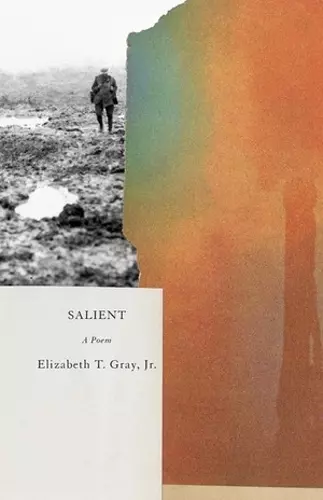Salient
Format:Paperback
Publisher:New Directions Publishing Corporation
Published:24th Nov '20
Currently unavailable, our supplier has not provided us a restock date

In the foreword to her book-length poem, Salient, Elizabeth Gray writes, “This work began by juxtaposing two obsessions of mine that took root in the late 1960s: the Battle of Passchendaele, fought by the British Army in Flanders in late 1917, and the chöd ritual, the core ‘severance’ practice of a lineage founded by Machik Lapdrön, the great twelfth-century female Tibetan Buddhist saint.” Over the course of several decades, Gray tracked the contours and traces of the Ypres Salient, walking the haunted battlefield ground of the contemporary landscape with campaign maps in hand, reading “not only history, poetry, and fiction, but also unit diaries; contemporary reports and individual accounts; survey information and maps of all kinds; treatises on aerial photography and artillery tactics; and manuals on field engineering and tactical planning.” Out of this material, through a process of collage, convergence, and ritual chöd visualization, Gray has composed a spare, fascinating lyrical engagement with The Missing, in shell hole and curved trench, by way of amulets and obstacles. What is salient rises from the secret signs in song, like a blessing, protected from harm.
"I found in Salient something of a Whitman-like spirit. The poem will not let you go under. You may have to hold on with all your strength, but it is important that you make it across." -- Harvard Review
"Gray’s accomplishment is extraordinary. A vision floats up from the muck, a promise that can only ever be disclosed once we accept that all of life is a preparation for our own personal battlefield oblivion, our own interior Ypres. Finally, the poet must understand herself as the one who is atomized, bereft, and lost in the present, speaking, ultimately, as one of The Missing, begging a maternal god not to depart. Reimagining, here, in historical terms, what psychoanalysis and critical theory understand as the death drive, Elizabeth Gray Jr.’s Salient finds the sacred, finds it and returns with it, from just past the outermost bounds of the known." -- Hyperallergic
"Elizabeth Gray’s Salient is a masterpiece, by which I simply mean that it is a work of the utmost poetic accomplishment. Deeply rooted in modernism, especially in terms of technique, it is also one of the most original books of poetry I have encountered in quite some time. " -- Norm Finkelstein - Poetry in Review
"If Salient were fiction, I’d compare it to Sebald or the early experimental work of Ondaatje. Like them, Gray considers rather than presents history. Like their work, her consideration does not lead to a re-presentation of history but, like the chöd ritual, to a dismemberment of the self. In poetry, Charles Olson comes to mind. Gray's individualistic approach to history is what allows her lyric voice to disappear through poetic ritual." -- Devin King - Rhino
"Taking as its title a term that describes both critical insight and a devastating battle of World War I, Salient is a work of lyric investigation and recovery. Elizabeth Gray mines field manuals, trench maps, soldiers’ diaries, and officers’ reports—seeking a language that can confront the horrors of modern warfare. Addressing a guiding query—“how could one imagine this?”—Gray marries painfully precise historical accounts of the Western Front with the language and practice of Eastern protective magic. In so doing, the poet finds the “portions of this evidence which are obviously song. " -- Nancy Kuhl
"A remarkable work of poetry. Everything invoked is both crystal-clear while yet retaining its crystal mystery. There is a magical accession to the delineation of links and relationships developing in the poem, even the physical connections (real or imaginary) when moving from soldier to soldier, woman to soldier; poet to soldier, woman/poet to lover." -- Nathaniel Tarn, from the afterword
"Her journey has allowed for the imagery and wisdom of ancient texts and stories to come alive.
" -- Dana Johnson - The Rumpus
"Extraordinary: Gray concludes this striking work by praying that the goddesses will do what humans never could: just stay." -- Heather McHugh
"When one thinks of the soldier poets of the First World War – Sassoon, Graves, Owen, and so on—one gets drawn into portrayals of dismemberment, gas, rotten leadership. A hundred years later, and a civilian, Gray has to take a more subtle approach. She researched her subject thoroughly; walking through fields to make sense of the battlefield maps, reading the artillery manuals, and pouring over the incident reports. Rather than seeking to answer the question, how was it? she asks us to consider how can we know?" -- Fergus Smith - Journal of Veterans Studies
ISBN: 9780811229241
Dimensions: 216mm x 140mm x 10mm
Weight: 157g
112 pages